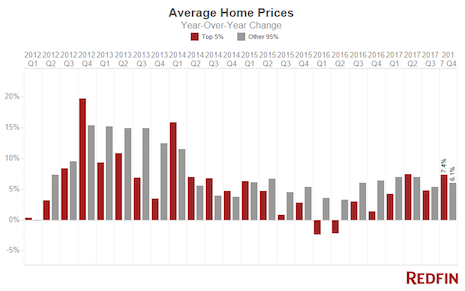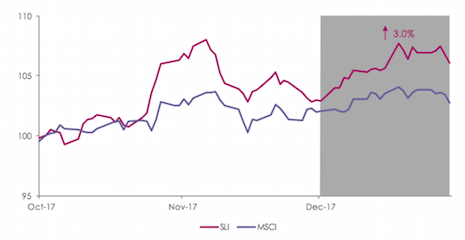The tax reform bill passed by Congress late last year is poised to have an effect on the country’s luxury real estate industry as buyers consider moving across state lines to deal with tax rate changes.
A report from Redfin found that 38 percent of prospective home buyers cited high taxes as the primary economic concern that would shape their purchasing decisions. Now that the law has been passed, these concerns may diminish for more affluent customers while increasing for those less well off.
"Tight credit, lack of inventory and high demand are the major factors that tell us there's no housing bubble, despite rapid price increases," said Nela Richardson, chief economist at Redfin, Seattle. "There are still many more buyers than the current housing supply can support, with no major relief in sight.
"Strict lending regulations make it much harder to buy a house you can't afford than during the housing boom a decade ago," she said. "Finally, still-low interest rates somewhat offset high prices for some buyers."
Tax breaks
The real estate market is one of the more delicate ones that luxury consumers deal with, as it is highly susceptible to the fluctuations caused by changing laws, regulations and the status of the economy.
With the passing of the sweeping tax reform late last year, it was inevitable that soon the real estate market would begin to feel the effects.

Redfin's average home price chart. Image credit: Redfin.
Redfin reported that last year, taxes were the primary economic concern that influenced buyers’ decisions, particularly about which states they decide to purchase property in and how they plan to spend their money.
Similarly, real estate broker Tony L. Smith found that buyers are leaving Massachusetts, which has a property tax of nearly $10,000, for Florida, whose property tax is around $2,000 less.
Seventy-seven percent of respondents to Redfin also said that they expect housing prices in their area to rise over the next year.
The Republican-approved tax plan would lighten the tax load for many of the country’s wealthiest people while placing a heavier burden on poor Americans. This could potentially lead to an upswing in luxury real estate purchases as the richest Americans will have even more money to play with.
Global real estate
The controversial United States tax bill passed by Congress last month has given the country’s luxury business a serious boost, according to Savigny Partners.
The Savigny Luxury Index saw a 3 percent bump in December following the passage of the new tax bill, which critics feel has been designed to give more money to the wealthiest U.S. citizens. With more money and lower taxes, luxury investors are celebrating and the U.S. luxury industry felt the effects (see story).
This has led to a boost in luxury real estate but not every part of the country experienced that growth. As the luxury real estate market begins to recover from a slow run, San Francisco is still struggling with the largest decline of the year.

The SLI had a 3 percent boost in December after the tax law was passed. Image credit: Savigny Partners
The last quarter of 2017 saw 7 percent growth in luxury home prices, fueled by an increase in demand, stock market gains and finally a shrink in demand, according to a report from Redfin. While in the recent past the luxury real estate market was plagued by an overabundance of listings, on-the-market properties priced for more than $1 million saw a 23.8 percent drop (see story).
Outside the U.S., political uncertainty has played a major role in the real estate market of the United Kingdom. Prices for prime country homes in England and Wales rose a mere 0.4 percent during 2017, according to data from Knight Frank.
Despite a rising demand for properties, there is not sufficient inventory on the market to meet consumer interest in prime country real estate. The number of listings priced at more than 1 million pounds or $1.3 million in Britain and Wales, excluding London, fell 6.8 percent in the year so far (see story).
As buyers flock away from high-tax states and towards those that are more forgiving for the wealthiest real estate owners, luxury real estate will likely experience an overall period of growth in light of the tax break given to the rich.
{"ct":"IYuqkBY7hpp64Rsfi0vR\/CISwyYgRphNUv+q+J7llwxJVal7SScYEoQG95qx3VupRvrh4TJGmOPPgu9LehI5HEYTENDyNgjpz92aB13IwfEuDP0DSCFW+EVxZFraoRchSV\/uIs3VPPd8W1maxkZb\/\/bBHwqdpsNM3yKTUrdKbZWL4yLf+TwVLC0T4Eq4bbJKYlklvvykGwUIoBKeOHrNbp9xczL+Hqbn\/A4As5QTvbUWwE0SrFx6+fOdYtjdd\/IHNr3nPuN2iCSqVT6r3mK6coh47zdctasxbCPDr1gg+lDrUMlr9HvxKIUynVm7YYizaIjj1\/ekoufwVnpBTDRbezS37LznuapoH9c63rxL4xpWEvqHzw7SyiTysuwL1skWKwRYy6+AEmNXlyndYRsy0L6DrHVgDgq\/3fhhEz5ibXWWacDcCqTQNsP37NWg62hajmDz9eELLuQsD9fW11Tpg1hVMnB5Cj4lep9MIGUoiL6x5WivymCnmNMLDXtPN5\/6GDQI4dQFg0+mvya8MRJXQZOSCEFM6768GOqavdN3u1eEOSL7h05ZXHkiWg8U9zCJbxxLtBhsKY5yYgGj9VByMNkTrqU5OhUdd+7bSUDDt6GQZk\/yDpYQCdOan9\/JG9dmNjK74CxrZEp0d2WC2mpnXhNA7sjDbyz7VaH8dNHftT5Z3Oz\/OwW8do3h2\/pvq0BuL\/b02U1l3YzczTRGjxQka\/Xo+JrXxYRaqaG2bdhxgdWvtWtdxj1ne+Ok7W0Y0VuXTFVRuq82aSzyIbLw5KmLssP0rehMz3iXaS03N+ADOP4GgVknL9G3M+69EIUt\/nS9P+UEmrmnQdNcOTVBm8pZmAzWVj6QpnyT32ZzNyYHuO147CrfJ75+R+1oCTyh4kD\/H7Y8cLXCkCtw6o38IvUGvcXb7fSdg+tBa0shp\/SqkZl2NXXlojDzvKOzfq\/Rq7KXWg+x\/VPm\/iVkh0PtvJnxuLGaB3fywjQptqHVBk9NuPRyUW2XEFarnRCU8ekMB6hSvl\/Qjb2ZHiMboiEj0yWIVq8D8DLLtbL26Xy9V5Cxzb9IKi+jxgQ3JwP2uy6D5m1v79p0\/\/R0tSYqJ\/6GOTCjznoeAeZIrvlOaSAKaCxUYMujdeiKQsNDR1Bheybdy8phCJMN4L4E7eSvURp1TQXB7DjX3MMtxOjsoHlQKSc7i6ET2n2lkYzMQvBCc7UIkCxB4ogaeQFuD+szQN3XmQLgrom0trt3ueeNzPzOPKPHVKD7BR34pe9+HVVtZZL83MrM6Exkq1NUstRJeUj4zbHnqqG\/BmQd9FH5HGtETuGCdiEnEH0uaMXyy\/UdMspeAZiDJoPu8IlDCtoTatsRL620wtJleydMMkuRfR46g7w0V1T4tl85QOzFpeVNrc2kj5p6wY5ZjMpsRHAXuQdu1sd09K5Vl7D6pS9kviYyUJYuMfWRxPqUxl6MLtNGmmgACeRlE\/vhFHPVjQZiVFFDlzD9gpBSUf3XBHloNCY1pwK5tnoPDfEGv2ieOuqge+MQIjChFgRu0rukLhUjIkCxgzLmxMqly6yjEovO7RtktOi2uVHmOLxJPxycCGyOGgTCudhMcQnX6g5jwIlnw5LWhjvFQf1\/tOicBP940K3JkJ81LmJZsTr3LNx8lqGtYyVW8ML5hfKVbJJoO\/vbZ0CZFsifOyHQbI8TlrdTfGtSRA70ve33o35dJ3SUF793SPMoZS6\/Grqc\/KWhC03GczYddKSbZu2sxMYU0RbuYgm2A165wUnsNMzU3bywne3P+vcC6Mlb2taiLUfIzTQvwkTwfkfEufkZ0OWtLp\/PA3XGD4N0ag6IsuyoYFFK7X5f74p9rokm2LtTBHsOyn0vWYGXe1A5xDeuW3gHKgnHaJNGOls4IEJaLEF5cDyblwj3Bj8U2gSTOu2dIf1rknSpfhHMKbJSdnejqrGVCdtVAQxzPqAqZB+FDWyEC0LFUpYMGIcb\/U+3\/JXUzw3RAL26luMdxCSaz2UYK\/DeRDtGbV5y70wEIIL\/UZcNmchtZU6xsfgQUsMV1UWTNyL4nH0a87mJw7SI840XBOeEGMxuQV6Poer\/9yaKSJ6Oh2o0hAyRmEv6fN6JkheRYBLAPZhuU5PBSoj5HCRVEvcg3BKC3D44cfGlq5GyWvEoTqx2HgEagkk0hRlCAUHQ7CfbT7mrfwmHU9F\/2wPlAV2gRDmYp2ze2ssCAQ0IYZN3OaF99s2zUFoUB4QQQasVyxhMOIAJKbaREiZ6EZKA4QkJPVGrty3pR7KfnOIfRhJ1wmuHabcGr5mvnVzrRqpE1A++CvlQQ71spX5UJqTMxrLUaSYrr2\/tZlAaPc13KhKhwy021Di0gJJ26clruLvL5HOJwJeyYTwndlk+V8\/5qkwDT3cKpOPwi8qOOpQ+Y0eYd\/7xYYlGG+K9OPzu\/6MztjbS+SwpTTEW0FIPIDRTHRnrIIClcB3cNKtk5HF+ov9eV3Rk+TQNHnlMtyktbHDTj1DKWZnOq4t\/6kGtOmgo6hUNcYnVm9nFrBM+04twWgV6Kjh0\/Gr890MHR2GKKIwWZX\/idCUfpjDMsdW3nfDi3Pp6w\/vtH7hS1rR168HXwOs\/PCE3n9ZAN701aOiiWdLof2qhCSMwvYkBX1qkYFNE5FIZgVli1ngCdOqYawMohtYrBhiwX8YENRLhR3\/O6WvQRAHzS1R6+wUBHBbqP1RT94yOgleBRNUby0oNqTlI3077qyq+Gmg1p+i\/0VwBkUE9ya4vnh3FvHBqME+OpVAqk0OZ3p+ud7eEnmPcuQXXAc80s1FOHKA6rY7eW2zfcx6wvfZV\/vfY4kqoFbtjAEhwZ1Pli\/Mt3ytR0HVz+IEnkNVeBuRo0mpa5+1W5SXVHo9TzeMxZpDfNhTF1fwwsSmFvIEgyWnv5oavohwk8epnMJ0zMblCaBp33sh\/JwvwqffwdC28ZujXu80CdqZvSYnDY2Jp2iILSDsI4dzrOaOxTaSPlS9z0qXspAd5RBdJk0hFvZLFzJ4kB5yKsUArVpB7cYpsHqC9FeoYn2Tf6KYlGWcf9FkefXwVCBE5Il8YAX7oSu1HAsmLKN+AKWPgkA57WXk1bYcMWn+e\/6nIjaRPqCkpIo4bNCdrjiPSDuEk6CKU6WuY28WNWFgH\/8hCafPPhGTmWyIMPFSeUOVF07PeMcBj1DTFrUwzWCTV5rqa9es80cDcG7V579jRarLEo5qXvpeTmBUBuyyKB\/W0WNrBCPtUHOj9Ln+mAOQRPh3+NaYmyXGUJv72Lg\/n4XkOQqo0H0VyduIKPYMeR6lB0S293GbmloT1U44wakGHT4Qp1Kn4weI7B8FdHX9\/QEn3BM7kkLA5IctR5lDxi7602NJrPYsAiDzrxYxpRXhrlgfFXCLvOHyV0jlvr0gk\/PoR9KMVCiH\/XX0CPP8D7JrOGWd+mFPbYHeazdUwQ3sk3EcnhbJzJYLGqkafKM+RogS7vOUUIi43KpxeTUGO04+rg4JQF7KlGm9yR3q+oWEtKoFdSoWrCfXIqI1boJDfcLSMLdVTkRQkvXwJu7Twx+M8UrIpapOA+R+MCv2\/avrkL1BlkWNjXLZ1AcZqz15\/xZD\/7J0nnhrhiFMEmMvhY1JTJUf6FifsSLLDpsXm3cm+AjmBQF+m7psMOkU2wlEbj8CPntZltEuwJgYPr71rEHfp\/ZUqlvj\/OClXv4Kynitoq+Hn4uAVY+kkYkQfkJLAb3Ibs76PN0JpOZ8JPA9uCowOzbh+9tEbmDslZzZSB1k46kowqKoRhwxRfTqjTkvKctXgAEm6TaMs3EF3mCh8XVEH4JzizpRqHGwdqksVB+jFLbU5R68brNVgaVfgTNUY3k5S\/nGWfUQqkJDmV5bG+BTbZYmlfdVU0ZcwFTvqJjkRvusc49BwQdI6kwmkVONtywOSDgDfRC87zwfdmknzyu6q45nuJa\/z7yHTymjv6UGQ1fo5jZjec3cJo9Ss8P9EHsDT0st\/PUgIQvej6SCX3PhzUsdM6hzTCJtYQ3fYGIRJpTZrn9XZdSk8Ixcmg3DYiYu5zKFEMfYDSFkpqo8oZ1C1p+sgsXBgbp9D\/lQM3ueuVpTRWKdw6OxML5NxKnkEsRGys1\/LcoPaAHi0nvkCHu1ja1MSvW1LBCEtohPKsZM6RTeZKJo0y6DgNcX6r6ezh+8JTPRYe3AoFJPiwql7Gncb7DxWNeGbw0r80NZq7uSHQm+KE01QqAFOG4+XWaaI0lG+1et1o94tDvYYYtxCoENp8Ihpe4lkWtc7htwJTtAUa3ya3vXVECQ5z6IsKFNYkgE08RiKvJziXf3LDC8zRLV9JZUpwDA\/ZwmU9jhTupe9sC5pI7BVJkDcST7wx9gvv2LS8J\/rW024\/5Ikx9P2mt+ZBgWrUxZBE8RPEp4Q1GU\/ix9Cs2OB67TNqf45ddkJvg+qYWFDSMPOccivHrQjFdKYCYUTWnReWBRcIUzGdxm8vk1lbH7w83CK292EdtIsbCRL6r2LbmsA1x+NHxL2kyzksXy57XYHJj0C9D26rqrA9k7dkghJDCS8bwTtPxLCWePTnXptxtmKAxDgVAFAPgSR7eGi1fdBEZpBPq+6M4EluvwJOYpIqWgS04zc0B9IRf8GDFjjmnYVwC1XG76HdHR2i9ROTuFCDaF+Q+VVbHpCcsUP5K4gufHiq+y8TmoAhHXADKVPGowrXY2UBbXpTLXAzkheSHbpwjaDaRvoh37z9ODwfGYwnyTMJLPVPphhuFQe20PTvYueevzxlxQCpCz1ZN8yxGQgyUIeOb6t9\/Oi5LcABdNoKE1QRYvy6b5kW2a5DFnq0wXYSYWiCBA9kBqQRvikeQcS6mlac84SDNmDspQ+GRuUp+lk6WtpiCW9hJGKPyW+RpsZI3pU8GhhaIGuFMNk85CsL2AeYd8sQUb8ur574VC6NEk8JGcqQP2g24H3gxtyj75B4QtkiXVNj7Lhpc6+98f1EBrgKExFT0onvW0ZCHC1mGQDJpGt6UqI6l51mJexxrfa2MZaSR\/oIOIAmxW7gQo46nKyayiTfCtJWVRyS47gaQZiLL3oxW\/JJSJ+iic4jfc+S9faKnRXoyDCL92OLWxeRIlUgv88ilG+OYhq\/SnZd6KUOx8pbH1b29DDJbs4HalGguilP9bBB9+nPKTW3ct631coNpo82UIGpI\/q7+RD+pASihakY7QR5hOvaDDhk5kPnWnFUqLzNG\/RCUV0Cn3UXE0JS3kV8WVRr7yT8pX\/\/Z4l8yaAAgcMddg8KAXlEJ7inpdsmT9iXFDNkbqJ\/ReoHg9rb2cK\/EFLzU0rWzwu67qszQ+YGN0Hs83809XSe8ilNiG\/exX8YJxwnxBHBWSEB2I4UVuIN7iVWRndyDeMxK5T\/hB3bg90wW4pmRbeUpKuVQSXxOjnIWBUX5434mAd4QxTGrCTGAXkw1797Ty6MNcNyzeXDoFYPtsceZoRQqefmbNQjSDfUM2DNQ5VPrbdNsVakPjzP12I7MsMI3mBjRnfYhaGppN6Hg3O+XPepXnN6oP3mWJTEhLWh6Vsb6ppK1HaGZHsb0B9a3OdMCqSFcCLBytfc9dOU2NOXKuW2R+IsrwW68UXQa2rgS1fmF6bV2xziZe49tEVMDNkHPMrYJQ8blsSrwFZgfYLwA4XCmREt0dtPewi0Cgiqkwys40s8KpAYmu22FYORGLNYbs5tzitPBKJgSnonQrV0gdsIrt98o8aUluxWzgdm1YpK9YJI8jS9YwlUqU8tx3BbzZliSAPOfpN\/31WICfNKTxW0Pl0CLWzKRU4LIDIPhTvzHm0Y129S1SVkMt9RukE7yb6HkTNBbgudJH3jbd2wzhvz3QWtlEu9GEuYBKeYZ6NNZW2fpV30GW7Avlh5PXlVfwexgMjEj0TlYJom94\/hDjPFwsv77ZOHfQhyYAbJCVth7PDRDvUeB35uwUclVAIvfPw5jJN2InpiHMdGPvLN27kYmWEGYIVBstHPOnDSkyo6jI4h4WStVXdsyc7XHOxqL6qhgA0IqiNAG6Aqf7PPhSDUePWyRkMKJwfzDEK2y31iS7eihEnNW+\/XYyNkhpz8Se6SFVYGehlHItt2ov10\/5fNaovCBRabxvAlCMNdoR23G4+JjiOK2lHEXKmZPjihi7XxQGSoHwUzUPTiffCPmnJiFQ9q84hpFR9rDg6zWQ3qtpPzs1Fu0Ert42CQg+TOj2DA\/ZVYfoWEGP241mCzYU6PX8I4R\/obDk1JfmFwwvuTmI4ZBhlk5i9eyAkqTjTB4GPqaRjmD22+foy1K2CBJ8L2S56RQR6JDMB2L+juAQsgdoSiCo381s0TtrSMOGPr2gHE\/SlDzo7xfw80AxiScIlhnQ8+UgfKLxE3Vsxwo9aXK0oY7oMHjpfoyUI06OZxRKukZ7XMNFISedV07TfRC3j9H15+ngD9cDLCC0DEFLcGjIMsm60XMNt+RRgxiFl6zobCOYSyzrRgioHfgCPWw9RazhKKhG0QiTVUP+8c9bf5m0tkT1hYdHnNfdCgz3NdjpHLRSogv2J+dHgxF3smZF92Lf2fnSiOewnitEtqx1wno68dHGcoL8Da2IXEbCvWwGvrgTN\/34h0PfmtNc8YIpaHPyPYrCoEKmX1hK2XSKcXypsCjzmCrEdOIYwEHnDU+XZsLwxOnTEp4yPHit79rjVKzIxKBjUv+1Q170BDYs4mmy+BCKfvV63E9xEt27grgI86+NrAXN0XxhE7o1NmuZLOXYDCL3EnF7xtWdcoCr6yhRGktcZVN05i+w+dw2uwlzFHBRg6rRzgs4CnkRXzn73fG2KCrNq8vsHnl1parW9ktfmWgNKE0zwEpSkjOJzgNLUUtv19FMyY8ZRAqmhfuJ7rA9Zdnw3iuw+YexCDrUdw+kWtQxdlJwMXta4HY\/dgr5RFyF2dze58fDDxnjXdISrBohBHc105ze0ir\/cBwJh2RMBEn06kOYW1ow57q+F1FtYuHkhjWYnNiydGVdzLqsmGaUouTfZ\/MlIR6i7ubtx91yxKy\/wQjH74Ua2pzcVVHjCVMD4JPj59Ocilc1hDg5wd8roX\/\/wTK8sCbxpsotwcs96MsYInwuq1IvzKXwc0ezruO67INYEKUN2B6mQpMf2NiykDBWZo1jIid1SyuMxc9w+y84n7Zq6\/5i9UMe3FYqwuxEcCBUwCfegXi7laezb1O\/V\/T2JfEhEGJbTsLubSkSf0QojKii0IIK6oECse3w1Gm0tuZq4YGLA4BZ1TkNUk8BpdkmPoU1a754nJokDA+E29E4RluRzCajTHyB7Qe5Vr3io92b5cGr5A5lAIwG7Ny6yDOtbImmEp5KE3BEwKOm7fPTtBd5pRjyRAFsCi6RmA11uZKYFIYBOfZ8NULQcNeM1r3uCCZsB6pgcvySPpyKMFQw76M5nJ7NJF0wNhfCWBJsemSdL1oFAizqR3QYPPTblun8E7DNaqgxqBSlef0jj1k5f+9Viw\/ZERtZ\/ezcL7argKlsPVFUaNRl92G3nf7rRYN4vkwsESgLbI089u9Tp9fA3fCDButbjxfIl+Z88SRbPmZSm0o+8TnhfyZ6q0bVSvaBKr85Udg9\/chwiUfPBy0l13xHHap58rYll6nmQennNwKnkSI2iizlWr0dFOO\/69+aTFcbUuvbNnKouUIAiKws5pWj4vALCsvw9U99Tu4pyb5T7UIDZ82vZybIRmZ7N+3dwmZSz9yXHN5kqUlseEmQG48CDMftx\/6nEAWJH1hZeLkfz61fxBg1IIbGE94\/4p5we6LXuoobU\/Xxu3REZUPzLJFTD26xJWpndajT0DfhdxMFXB+O+xiDkGvtKTbSnuU2OGr0lH8anAUIhgeo4SWK264+mPxKesd\/iylMyN4TqDl1PEuoBvgm\/OIree\/jwThkXsyu8Awh0rNi20MXPsX2thBifFIFqbLCg5bEVHXveMvZKPUFiEacrhpTwigotq+K+ZE\/fsdD2Fdw=","iv":"4716749706ea662a312ea1b17a84b98e","s":"721efc58274a0460"}

 The law has given immense tax breaks to the country's wealthiest people. Image credit: Sotheby's International Realty
The law has given immense tax breaks to the country's wealthiest people. Image credit: Sotheby's International Realty